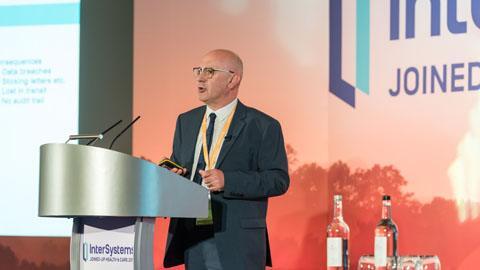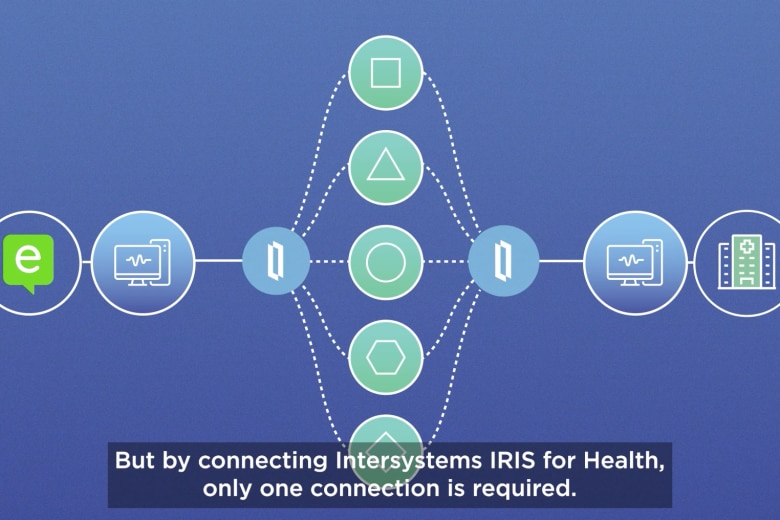With the STP process heralding much change for how care is provided across England’s regions, individual NHS trusts need to show how they are making the most of technology to support a flexible approach to care delivery and providing the building blocks for change.
Dr Graham Evans, chief information and technology officer for North Tees and Hartlepool NHS Foundation Trust, shows how implementing an enterprise-wide electronic patient record is providing the foundations for joined up health and care.

North Tees and Hartlepool NHS Foundation Trust (NTH FT) is one of the many organisations involved with the potential reconfiguration for hospital services across England as the NHS looks to achieve the ambitions of the Five Year Forward View and deliver new models of more integrated, and efficient care. For us, like many other trusts, this means repurposing existing facilities, consolidating expertise and exploiting technology to better coordinate care provision and deliver care closer to home.
To make this happen, it is important that the right building blocks are in place. At NTH FT, this has meant replacing multiple legacy systems with an electronic patient record that brings information together in to one, unified, enterprise-wide solution.
The aim of this streamlined approach is to support a more seamless care experience for patients and more operational efficiency for not just the trust, but potentially for integration with the regional health and care system as a whole. We can now provide richer clinical information at the point of care and provide the foundation for joined up care as we enter a future of redesigned health and care system.
It means we can deliver the tools for our staff and patients so we can achieve the ambition that ‘care is what we do, and not where we go’.
The starting point for this has been an enterprise-wide Electronic Patient Record (EPR), which is an essential part of this process that we should all be moving towards.
EPR enables rich information at the point of care
The trust implemented phase one of its EPR programme in 2015-16, with the replacement of the organisation’s Patient Administration System (PAS) with TrakCare from InterSystems. This included the rollout of supporting electronic documentation, such as electronic discharge summaries.
The EPR programme has helped to align and integrate a range of clinical information systems, and in so doing the Information and Technology Services (IT&S) directorate can enable informed organisational decision making through more reliable access to information from multiple sources for frontline staff. This unlocks the power of information to improve decision making at the point of care, and helps to achieve our strategic intent of developing IT services that add value to the patient, in terms of improved outcomes, experiences and support. It is also consistent with the trust’s lean improvement philosophy, that aims to get the right things to the right people at the right time, and so improve flow and eliminate waste.
For example, now we are integrating primary care information with secondary care information, interoperating with TrakCare using the Medical Interoperability Gateway (MIG). We have a contextual link within the TrakCare application that allows our hospital clinicians to see the GP record directly at the point of care, providing the rich information required to help deliver more informed, better care. Naturally this process and access is undertaken within an appropriate goverance and consent arrangements.
Through interoperability and integration, we can deliver a holistic view of the patient for clinicians wherever they need to deliver care. It also means we can keep patient and service user’s information safe, secure and up to date, and is helping achieve the ambition of being paper free (or more likely paperlight) at the point of care by 2020.
People, process and technology are the essential elements
I know from my previous work at both NHS England and the North East strategic health authority that technology is not a solution on its own. People and process are equally important. New systems can mean different ways of working and organisational cultures can present barriers.
This can be a challenge for regional care planning. But with strong governance, involving all stakeholders across the region, and also by building on a strong technological foundation, we can move forward confidently and collaboratively.
In hospital care, a solid infrastructure and appropriate clinical and line of business systems are essential. For other organisations that are less mature, you need to be agile and responsive to help meet their needs. We have chosen to deploy an enterprise-wide solution to enable this flexibility.
If you have the ability to move and change quickly, you can then deliver things more responsively, and this can be an essential part of addressing any cultural or organisational barriers that may emerge. We can show people the positive impact of new ways of working, and help unite disparate individuals and organisations in a shared vision of the future.
Embracing the digital opportunity
Pressures new and old are being felt across the NHS. However the current systems are not prepared for the high demands they face. Scarce resources mean we have to work smarter and more efficiently, and this is where technology brings a different paradigm in care provision. If you look at other industries, such as banking or travel, there is an emphasis on self management. Consumers transact online. The NHS has not yet fully embraced the digital opportunity.
But I am very optimistic that we have the right building blocks in place to address this. The north east is my passion, and I hope to bring pragmatism and vision to the future of healthcare in this part of the region. By bringing together people, process and technology, we have the foundations to drive the new models of care that are central to the future of the NHS.



































